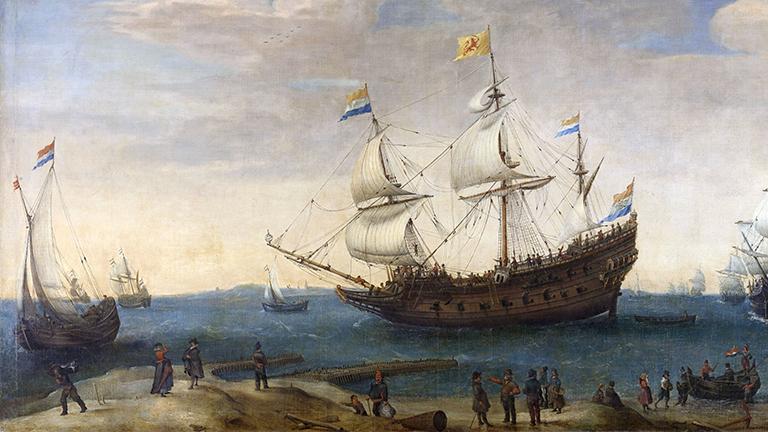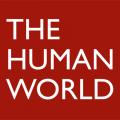
During the Little Ice Age, the Dutch were a source of goods for other countries and sailed the largest merchant fleet in Europe.
Painting of merchant ships, Hendrick Cornelisz Vroom, 1600-1630; Rijksmuseum, public domain
SOLVING CLIMATE | HUMANISTIC PERSPECTIVES FROM MIT
In this ongoing series, MIT faculty in the humanistic fields share perspectives that are significant for solving climate change and mitigating its myriad social and ecological impacts. Anne McCants, an MIT professor of history, is a Margaret MacVicar Faculty Fellow, and Director of the MIT Concourse Program. Her research and teaching interests lie in the economic and social history of the Middle Ages and Early Modern Europe, as well as in the application of social science research methods across the disciplines. She is the president of the International Economic History Association.
Q: There are many sensible approaches and ideas for addressing the climate crisis. Increasingly, it looks as if we’ll need all of them! What perspectives from economic history are valuable for addressing climate change and its impacts?
McCants: The present state of the climate suggests alarming prospects for the future, which is why it is reasonable to focus on mitigation strategies; we all naturally wish to ward off calamity.
Fortunately, the capacity for anticipation and planning are hallmarks of our success as a species. In essence, this capacity is the ability to learn from past experience. So, while human-induced climate change is not a challenge we have had to confront before, history can still offer us guidance. The prevailing climate has changed before, so we can consider those earlier impacts, both benevolent and dire. In the preindustrial past, warming generally brought benefits and colder periods hardship. Always, greater variability challenged human systems.
"History shows that not everywhere fares equally poorly when faced with climatic stresses. Open-access societies — ones that tolerate a diversity of views and do not restrict agency to a preordained elite — have generally proved more innovative and resilient than less-open ones."
To take but one example from the last millennium, favorable global medieval climatic conditions deteriorated at the end of the 13th century, ushering in a long period of colder and more variable conditions (for both temperature and precipitation) that culminated in the so-called Little Ice Age. This lasted from the 16th century to the middle of the 19th century.
Historians have argued persuasively that such climate changes played an important role in many of the ecological and social disasters that punctuated this long period. That climate matters to human flourishing is without doubt; that the zone of beneficence is relatively narrow seems also to be the case. (Our present worry is for heat, but cold is no picnic either for a population reliant on agriculture to feed itself.) Appreciating our sensitivity to even narrow climate fluctuations is crucial, but it is only a first step.
History also shows that not everywhere fares equally poorly when faced with climatic stresses. Open-access societies — ones that tolerate a diversity of views and do not restrict agency to a preordained elite — have generally proved more innovative and resilient than less-open ones.
The hardships of the 17th century at the nadir of the Little Ice Age were real enough, but while a wide range of social indicators stagnated or declined elsewhere, the Dutch Republic grew and prospered — resulting in the Dutch Golden Age. In 1673 the English ambassador to the Dutch Republic, Sir William Temple, noted that "Holland is a country where profit [is] more in request than honor."
"In the case of the 17th C. Dutch, everyone was entitled to have a go: immigrants, sons-of-laborers, and remarkably even women to a greater extent than anywhere else at the time."
And by profit, Temple did not mean avarice or greed, for he also recognized that "Charity seems to be very National among them." What he observed, as notably distinct from the aristocratic Europe of his birth, was a society that cared about people in need (funding orphanages, old-age homes, hospitals, and almshouses in abundance). Nor did they find it shameful to achieve financial, and thereby social, success through hard work (profit) and ingenuity (science). And, importantly, everyone was entitled to have a go: immigrants, sons-of-laborers, and remarkably even women to a greater extent than anywhere else at the time.
Sources of hope
I find hope in the knowledge that when cooperation and openness have the edge over conflict and parochialism, formidable challenges can be met. History is no stranger to conflict, but as we move forward to address the climate risk now facing humanity, I hope we remember that cooperative and open-minded examples are also available, ripe for the learning.
 For centuries, the Dutch have been masters at harnessing wind energy.
For centuries, the Dutch have been masters at harnessing wind energy.
Suggested links
Anne McCants webpage
MIT History
Interview: Anne McCants on the World Economic History Congress at MIT
Interview: Anne McCants on the connection between innovation and social equity
Story: In the History Workshop | Building a printing press illuminates human systems
International Economic History Association
MIT Energy Initiative | Renewable Energy Sources






